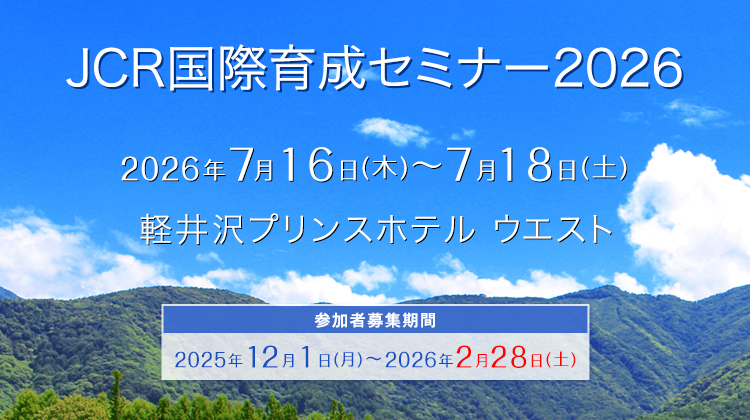
セミナー開催目的
国際的に活躍できる若手リウマチ学研究者を育成するための合宿形式による英語でのセミナーです。今回の開催で第13回目となる国際育成セミナーは、海外若手リウマチ学研究者とのディスカッションを行う良い機会と考えています。
JCR国際育成セミナー小委員会
委員長 亀田 秀人
委員長 亀田 秀人
セミナー概要
開催日程:2026年7月16日(木)~ 7月18日(土)
開催場所:軽井沢プリンスホテル ウエスト
参加費 :30,000円(交通費(日本国内所属先基点)・宿泊費含む)
募集人数:15名
セミナー公用語:英語
プログラム概要(予定)
1日目:開講式、Keynote Lecture・発表、Welcome Party
開催場所:軽井沢プリンスホテル ウエスト
参加費 :30,000円(交通費(日本国内所属先基点)・宿泊費含む)
募集人数:15名
セミナー公用語:英語
プログラム概要(予定)
1日目:開講式、Keynote Lecture・発表、Welcome Party
※ 開講式前に「Tips for Improving your Academic Presentations(仮)」 講演を予定しています。
2日目:Keynote Luncheon Lecture ・ Keynote Evening Lecture、発表、フリータイム
3日目:発表、修了式
発表時間:ディスカッションを含めて30分/1人 ※ 発表時間は最大15分まで
3日目:発表、修了式
発表時間:ディスカッションを含めて30分/1人 ※ 発表時間は最大15分まで
※7月16日(木)13時集合/7月18日(土)12時ごろ解散予定
※セミナー参加者は、原則、全プログラム(開講式前プログラムを含む)に参加する必要があります。
※セミナー期間中の宿泊は、プリンスコテージをご用意いたします(リビングルームは共有スペースとなりますが、コテージ内に個室(鍵付き/専用ユニットバス)あり)。
応募要項
募集人数:15名
募集期間:2025年12月1日(月)~2026年2月28日(土)
応募資格:申請書類受領時に40歳未満のJCR会員
ただし過去に本セミナーへ参加された方は応募できません
※ 原則、セミナー全日程に参加できること
提出書類:メール添付にて下記2点をご提出下さい ※ 提出書類は英語でご用意ください(自由書式)
1) 履歴書およびPublication List(English peer-reviewed journals)
2) 発表内容についてのAbstract(リウマチ学に関すること) 最大400ワード
※ 過去に発表した内容でもかまいません
提出先:JCR@ryumachi-jp.com
査 読:JCR国際育成セミナー小委員会および国際委員会(決定は4月上旬~中旬予定)
募集期間:2025年12月1日(月)~2026年2月28日(土)
応募資格:申請書類受領時に40歳未満のJCR会員
ただし過去に本セミナーへ参加された方は応募できません
※ 原則、セミナー全日程に参加できること
提出書類:メール添付にて下記2点をご提出下さい ※ 提出書類は英語でご用意ください(自由書式)
1) 履歴書およびPublication List(English peer-reviewed journals)
2) 発表内容についてのAbstract(リウマチ学に関すること) 最大400ワード
※ 過去に発表した内容でもかまいません
提出先:JCR@ryumachi-jp.com
査 読:JCR国際育成セミナー小委員会および国際委員会(決定は4月上旬~中旬予定)
共催セミナーについて
※ 応募は終了いたしました。







